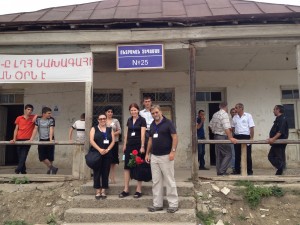A team of UC professors and a leading UC expert on election administration have completed an elections monitoring mission in the troubled region of Nagorno Karabagh. They concluded that the elections adhered to international standards and that this was a critical election in the democratization of the entire Caucasus.
Nagorno Karabagh, an internationally unrecognized republic which broke away from the Republic of Azerbaijan in 1992, held its fifth presidential election this last Thursday (July 19, 2012).

L-R Heghnar Watenpaugh, Karin Mac Donald, and Keith David Watenpaugh at the polling station in the village of Nngi, Nagorno Karabagh
The election returned to office Bako Sahakian with 66% of the vote, and 33% going to his challenger, Vitaly Balasanyan, a former commander in Nagorno Karabagh’s war with Azerbaijan who ran on a platform of anti-corruption and economic development. In a region where past incumbents have often received 80% of the vote, the relative success of challenger Balasanyan is seen as a marked improvement in the democratic nature of that region’s electoral environment.
A team of experts from the UC including Karin Mac Donald of UC Berkeley Law, Professor Keith David Watenpaugh, Director of the UC Davis Human Rights Initiative and Professor Heghnar Zeitlian Watenpaugh, an Art Historian and affiliate of the Human Rights Initiative, were part of a group of Californians that traveled to the troubled region of Nagorno Karabagh to observe its citizens cast ballots.
The team met with elections officials, candidates and their staff, local human rights advocates, including the NK’s Human Rights Defender, journalists and likely voters.
Despite some concerns about voter accessibility and possible voter intimidation, the members of the team observed that the election generally adhered to international standards and was marked by a relatively high voter turnout.
UCB Law’s Karin MacDonald was “very impressed with the professionalism, dedication and training at all levels of election administration, in particular that of local election boards.”
UC Davis Human Rights Initiative’s Keith David Watenpaugh, was equally impressed and while noting his personal concerns about the intimidation of voters, said, “One very important dimension of this election that we observed is that even the major losing candidate and his campaign, despite their allegations of unfairness and irregularities, viewed this election as a critical step in the evolution of a fully democratic society. This same sense of what the election meant was shared by most of the people we spoke with.”
The team’s preliminary report is available at The EARC’s website (EARC.berkeley.edu) and the UC Davis Human Rights Initiative, http://humanrightsinitiative.ucdavis.edu/blog/
